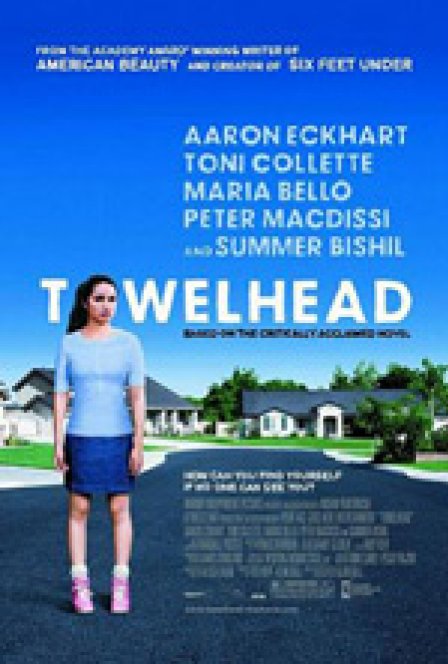The night before I watched Towelhead, I decided to revisit Stanley Kubrick’s Lolita. I don't know whether I subconsciously linked the films, both about a young girl involved with predatory older men, but seeing the contrast of what was considered shocking in 1962 versus the present day was a good historical reminder of what our society can and did tolerate. Watched today, Lolita feels positively tame. There is nothing particularly titillating, and rather than allow the audience to become part of Humbert Humbert’s leer, Kubrick paints a portrait of a truly deranged individual. Unfortunately, restraint is not a word in director Alan Ball’s film vocabulary.
Ball, responsible for Six Feet Under and the script for the Academy Award-winning American Beauty, turns his lens on a Texas suburb during the first Gulf War (to emphasize the time period, we hear music by R.E.M. and Fine Young Cannibals). Thirteen-year-old Jasira Mahoun (played with eerie maturity by Summer Bishil) is sent to live with her estranged Lebanese father (Peter Macdissi of Six Feet Under fame). Once settled, Jasira endures racism, sexual abuse, and violence. Indeed, Towelhead is being billed as a movie about “sexual awakening.” If this is typical sexual awakening for a woman, then I’m both glad and embarrassed to be a man.
Living nearby Jasira is the Vuoso family, a stereotypical Republican family that hates Saddam Hussein and considers all Arabs terrorists. When Jasira is conscripted to babysit the family’s young son Zack (Chase Ellison), she is called “Towelhead,” among other choice epithets. But that’s not all Zack introduces to Jasira. Together, they read his father’s porno mags, and Jasira learns how to have an orgasm. When the father Travis (a menacing Aaron Eckhart) takes a special interest in Jasira, the film begins a descent into a reality where all adults are stupid and evil. Okay, Ball likes to make his audience squirm, but in Towelhead, he seems to derive great pleasure in rubbing our faces in the stuff: bloody tampons and dead kittens are shown close-up, hymens burst, children are raped by adults. One could argue these are facets of "everyday life," but what is the point of it all? It seems to do nothing more than to shock.
But shock is not the only force at work here. The film feels exploitative. After the film’s climactic reclamation of self takes place when Jasira refuses to let her black boyfriend Thomas believe that her missing hymen belonged to him, you know there is a problem. What is Ball trying to prove? That Jasira is an innocent lost among the evils of sexuality and racism (Lebanese father versus black boyfriend versus flag-waving white guy)? When her pregnant neighbor (Toni Collette) takes an inexplicable interest in Jasira’s well-being, why does Ball undermine that goodwill by letting Thomas fuck her in the neighbor’s bed, only to have Jasira’s father find the used condom in the toilet?
I’m sure many critics will hail Towelhead as a visceral vision of realism and dismiss us detractors as prudish. Although the acting is good and the topic compelling, Ball could have done himself better by exhibiting more restraint. Like Six Feet Under, too many bad things happen to too many people in too short a time. Indeed, there is just too many issues crammed into Towelhead. If anyone lets down poor Jasira, it’s Ball himself.

